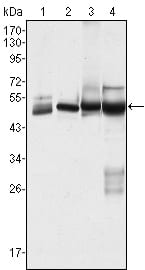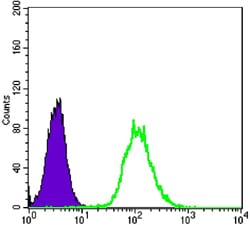

| WB | 1/500-1/2000 | Human,Mouse,Rat |
| IF | 咨询技术 | Human,Mouse,Rat |
| IHC | 咨询技术 | Human,Mouse,Rat |
| ICC | 技术咨询 | Human,Mouse,Rat |
| FCM | 咨询技术 | Human,Mouse,Rat |
| Elisa | 1/5000-1/10000 | Human,Mouse,Rat |
| Aliases | KRT7; cytokeratin 7 |
| Entrez GeneID | 3855 |
| clone | 5D12 |
| WB Predicted band size | 51kDa |
| Host/Isotype | Mouse IgG1 |
| Antibody Type | Primary antibody |
| Storage | Store at 4°C short term. Aliquot and store at -20°C long term. Avoid freeze/thaw cycles. |
| Species Reactivity | Human |
| Immunogen | Purified recombinant fragment of human CK7 expressed in E. Coli. |
| Formulation | Ascitic fluid containing 0.03% sodium azide. |
+ +
以下是3篇关于TUBB(β-tubulin)抗体的代表性文献摘要概括:
1. **文献名称**:*"Class III β-tubulin is a marker of paclitaxel resistance in carcinomas"*
**作者**:Kavallaris M et al.
**摘要**:该研究揭示了βIII-tubulin(TUBB3)的高表达与癌细胞对紫杉烷类药物(如紫杉醇)耐药性相关,并探讨其作为化疗耐药生物标志物的潜力。
2. **文献名称**:*"Tubulin mutations in neurodevelopmental disorders"*
**作者**:Romaniello R et al.
**摘要**:研究聚焦于TUBB基因突变对微管功能的影响,发现其与儿童神经发育障碍(如皮质发育畸形)的关联,为疾病机制提供分子层面的解释。
3. **文献名称**:*"Antibody validation for Western blot: Importance of tissue-specific controls"*
**作者**:Uhlen M et al.
**摘要**:通过人类蛋白质图谱计划数据,系统评估了包括TUBB抗体在内的多种抗体验证标准,强调组织特异性表达验证在抗体可靠性中的关键作用。
(注:以上内容为简化概括,实际文献需通过PubMed等数据库获取原文。)
**Background of TUBB Antibodies**
TUBB antibodies target β-tubulin, a core component of microtubules, which are dynamic cytoskeletal polymers essential for cell structure, division, intracellular transport, and signaling. The TUBB gene family encodes multiple β-tubulin isotypes, each with subtle structural and functional variations. Among these, class III β-tubulin (TUBB3) is notably expressed in neurons and certain cancers, while other isoforms (e.g., TUBB2. TUBB4) exhibit tissue-specific roles.
TUBB antibodies are vital tools in research and diagnostics. In neuroscience, they help study neuronal differentiation, axon guidance, and neurodegenerative disorders. In oncology, elevated TUBB3 levels correlate with aggressive cancers (e.g., ovarian, lung) and resistance to microtubule-targeting chemotherapies like taxanes, making these antibodies valuable for prognostic assays.
These antibodies are also used to investigate microtubule dynamics, cell cycle regulation, and cytoskeletal abnormalities in diseases. Epitope-specific monoclonal or polyclonal TUBB antibodies enable precise detection via techniques like Western blot, immunohistochemistry, and immunofluorescence. However, cross-reactivity between β-tubulin isoforms requires careful validation to ensure specificity.
Overall, TUBB antibodies bridge basic and clinical research, offering insights into cellular mechanics, disease mechanisms, and therapeutic resistance, while aiding the development of targeted treatments.
×